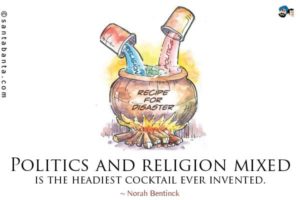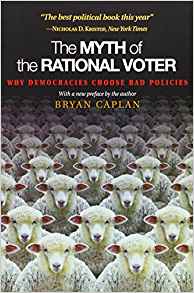Democracy is Predicated on a Myth
An Aggregation of Voters Find Truth
Democracy teaches its citizens that as a group they filter out error via majority rule; nowhere is this a stronger belief than in America though history reveals this to not be the case. Ergo, it is a popularly believed myth that substitutes its own fallacies for truth, especially during presidential election years.
I have been reading, The Myth of the Rational Voter (Caplan, B. Princeton University Press. 2007.). The author’s, an economist, assumptions in some respects mirror my own and coincide with Scripture though I do not think that was his intent. If you have been reading my posts you will remember that discernment is the practice of understanding the world via the application of biblical truths. I believe that Christians become so obsessed with this world that they forget why they are here: spread the Gospel about the Kingdom to come (Mt 28:18-20). There is the strangest belief of modern man that religion and government {politics} are totally separate entities that should not be conflated together and when they are terrible tragedies befall the innocent; like, war. This myth also ignores the truth of history that politics is born from one’s religion which is the basis for defining good and evil or right and wrong.

Truth: Supposed Separation of Politics
and Religion has Killed Millions
The predominate belief system in Western culture is democracy, rule of the people, inherently results in truth simply because the votes of the majority cancels out the error of the minority so that what is good for the majority is good for the totality. This presupposes that people can discern the truth and act to promote truth. Unfortunately, this belief runs counter to Scripture. The Bible says, “None is righteous, no not one, no one understand; no one seeks for God…no one does good, not even one (Ro 3:10-12).” Thus, as Dr. Caplan writes, “In theory, democracy is a bulwark against socially harmful policies, but in practice it gives them a safe harbor.” (Caplan, Bryan. The Myth of the Rational Voter: Why Democracies Choose Bad Policies (Kindle Locations 169-170). Princeton University Press. Kindle Edition.). As he quoted H.L. Mencken saying, “democracy is a pathetic belief in the collective wisdom of individual ignorance.” (Caplan, Bryan. The Myth of the Rational Voter: Why Democracies Choose Bad Policies (Kindle Locations 283-284). Princeton University Press. Kindle Edition.). Thus, voters in a democracy cannot find truth because they are blinded by the “god of this world” (2Co 4:3-4; 2Th 2:9-12).
One of the most egregious myths that is repeated nearly wholesale is that politics and religion can be separated. However, if we look at the function of religion and politics we understand that they are inherently joined. Religion is the belief system that defines morality {right and wrong}. Thus, anyone with a belief in morality, includes all peoples, has a religion; and, yes, this includes atheism. Politics {government} is the process by which that morality is enforced in a society onto and by its citizens {government is nothing more than a collection of people agreeing to be govern by a common morality, more or less}.
The reason democracy is touted as the best form of government is because it is based on ignorance. Imagine if I gathered a collection of random people to diagnose and treat your illness. Some of these people may have some knowledge of disease treatment but most will have no such knowledge; i.e., they will be ignorant. According to the myth of democracy, the more people I can gather together the better opportunity exists that a correct diagnosis and treatment regimen will result. I hardly expect anyone to agree to submit to such a medical system; yet, this is exactly the fallacy of democracy and nowhere is this more succinctly revealed than in the realm of economics, the lifeblood of any country. According to Dr. Caplan’s book each election people vote on economic issues of which they have little knowledge and what knowledge they do think to posses is largely based on myths that have been repeatedly repudiated for the past four hundred years! For example: people equate increasing prosperity with an increasing number of jobs. During periods of recession/depression people turn to government to make jobs {Keynesian Economics}. Yet, every time government makes jobs the economy continues to suffer. Voters, and politicians, confuse make-work jobs with jobs that produce a produce which increases the true wealth of a nation pulling it out of its recession/depression. But after nearly a century of obvious failures this belief system persists. Why does it persist? Because it is part of democracy’s religious belief system and must be correct despite its many obvious failures. Thus, while many democracies repudiate the blind faith of Christianity {which is not based on trust without rationality}, they cling to their faith which is blind to its obvious historical errors; thus, it does operate on truly blind faith.
The tragedy is that governments are the collective search for truth by various societies whose foundational premise is the rejection of actual truth (Ro 1:18-32). Thus, having rejected the truth of God societies must rely upon ignorance as their guiding light. This requires constant redefining of morality, redefining of the means of finding and enforcing morality and the active rejection of history that repudiates their myths. Thus, the belief that ignorance begets truth is akin to believing that random events can result in the evolution of a complex organism composed of irreducible processes necessary for existence. Those who repudiate such ignorance face ad hominem attacks at best and far worse depending on the events surrounding the myth’s rejection. Its always risky to expose a society’s myths during war as one usually ends up facing vigilante correction {violence} or governmental enforcement which may be terminal.
Thus, I am mystified that Christians believe in and actively become a part of such governments which repudiate the truths of Christ. Christ, himself, repudiated any involvement with worldly governments at His trial. He neither spoke for nor against any government but worked under such government as existed in order to teach of a kingdom to come. The apostles did the same. Yet, many still died at the hands of the members of their various governments. Why? Because their teaching of God’s truth revealed the silliness of their myths simply by being heard. Myths cannot stand the light of truth and remain viable; therefore, truth must be suppressed so that they myth may perpetuate. This is as true of democracy as of any other government of man.
This is becoming so self-evident that even among some non-Christian individuals see the fallacy. As Dr. Caplan states, “It is no accident that both of the substitutes for religion that Hoffer names—nationalism and social revolution—are political. Political/economic ideology is the religion of modernity. Like the adherents of traditional religion, many people find comfort in their political worldview, and greet critical questions with pious hostility.” (Caplan, Bryan. The Myth of the Rational Voter: Why Democracies Choose Bad Policies (Kindle Locations 442-445). Princeton University Press. Kindle Edition.). Why do they persecute those who teach truth even when their particular myths are not even addressed? Here is Dr. Caplan’s comment, “Political/economic ideology is the religion of modernity. Like the adherents of traditional religion, many people find comfort in their political worldview, and greet critical questions with pious hostility.” Caplan, Bryan. The Myth of the Rational Voter: Why Democracies Choose Bad Policies (Kindle Locations 443-445). Princeton University Press. Kindle Edition.). Now, if the non-Christian can see the problem, why cannot the Christian understand the truth and walk according to the Scriptures?

